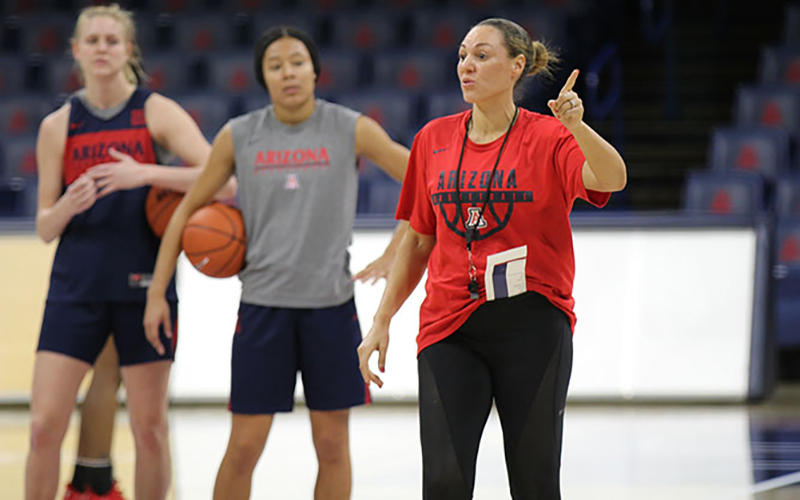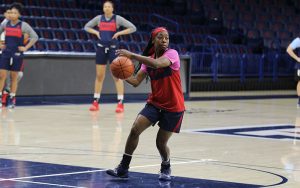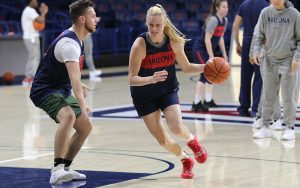
In her third season at Arizona, Adia Barnes has the Wildcats on the cusp of their first NCAA Tournament appearance since 2005. (Photo by Sam Ficarro/Cronkite News)
TUCSON – Head coach Adia Barnes knows what it takes to win at Arizona having played there from 1995-98.
But before Barnes even stepped on to the court, there were skeptics wondering whether she was good enough to play at Arizona.
“She had really big numbers in high school, but she wasn’t heavily recruited because she was an undersized post,” said her coach at the time Joan Bonvicini.. “They thought she would be a bench player, but I saw something in her.”
The Wildcats instincts about Barnes as a player were right – she is the most decorated player in program history – and so were their instincts about her as a coach. After posting just six victories last season, Arizona is in contention for its first NCAA Tournament appearance since 2005 as they enter Friday’s game against Arizona State with a 14-6 record.
Early impressions
Bonvicini, the winningest coach in school history with a record of 287-223, saw Barnes play in high school at the urging of one of her assistants. When she saw her play live, she offered a scholarship.
It paid off. Barnes totaled a school record 2,237 career points, earning Pac-10 Player of the Year and first-team All-American in the 1997-98 season.
Arizona, however, didn’t have immediate success when Barnes entered the program.
“My first year wasn’t so good,” Barnes said. “I remember going to Tennessee and Vanderbilt and we got killed. I remembered thinking, ‘This is a different world out here.’ ”
The Wildcats went 11-19 in Barnes’ first season, including a 109-57 loss versus No. 1 Tennessee and a 79-39 loss versus No. 8 Vanderbilt. Those memories have stuck with Barnes.
“Fans at Tennessee were like, ‘Get back on your bus. It’s still waiting.’ I remember that and I remember what that felt like,” Barnes said. “That was one of the best teams in the country at the time with (head coach) Pat Summitt so that was kind of a taste of what it’s like.”
Bonvicini admits that she overscheduled in Barnes’ first season, but it helped jumpstart a highly successful career which exceeded anything Bonvicini could have imagined.
“It exceeded my expectations because I knew she was going to be good, but I never expected her to be player of the year, All-American and in the WNBA,” Bonvicini said. “I never expected that.”
In Barnes’ final three seasons, the Wildcats posted three 20-win season, a Women’s NIT championship and two NCAA Tournament appearances.
Bonvicini said she wasn’t sure if Barnes would go into coaching but once she got really good playing, it was only natural for her to go into coaching.
“She’s always been a good leader. She was a very good recruiter right away because she’s a good people person,” Bonvicini said. “What has impressed me though was how good of a teacher she is. She’s very impressive in practice, very patient and she’s an excellent coach.”
Returning to her alma mater, Barnes has been tasked to lead the Wildcats back to winning ways.
Barnes was hired by Arizona in 2016 and went 14-16 in her first season. Last season, Arizona took a step back posting a 6-24 record finishing last in the Pac-12.
Now, thanks to the addition of three key transfers and a top-15 freshman recruiting class, Barnes has the Wildcats in contention for the postseason.
“I think we have a really good chance to be successful,” Barnes said. “We have an opportunity to make the postseason, whether that’s the NIT or it’s the Tournament. We have an opportunity because we control our own destiny if we play well and get the job done.”
Impactful additions
A big reason for Arizona’s resurgence is the influx of talent in the program, headlined by transfer guard Aari McDonald.

A transfer from Washington, guard Aari McDonald has emegered as one of the highest scorers in the country. (Photo by Sam Ficarro/Cronkite News)
McDonald knows what it takes to win. The redshirt sophomore transferred from Washington, where she played alongside NCAA’s all-time leading scorer Kelsey Plum. She believes the experience of playing in a winning environment has helped build a similar culture in Tucson.
“You’ve got to have that chip on your shoulder. I got to take my freshman year of winning and share my experience and knowledge Kelsey (Plum) and Chantel (Osahor) told me and share it with my teammates,” McDonald said. “So far, it’s been pretty good. Playing with Kelsey (Plum) and Chantel (Osahor), I learned a lot. You got to be that person to pick up your teammates when they’re down so I felt like I’ve done a great job with that and the team has been responsive to that.”
McDonald is the nation’s second-leading scorer averaging 25.2 points per game. According to Her Hoop Stats, McDonald has the third-highest usage rate in the country at 38 percent. Usage rate is the percentage of plays while on the court that ends by that player shooting, getting to the free throw line or turning the ball over.
After averaging just 9.8 points per game in her only season at Washington, she’s emerged as one of the most productive players in women’s college basketball.
“I think she’s just gotten better and better. She’s gotten stronger and stronger. Her role is very different,” Barnes said. “She was a pass-first point guard and now we’re asking her to do a lot of things. I think she’s responded really well.”
Another player who’s contributed significantly is forward Cate Reese. The freshman from Cypress, Texas, became the first McDonald’s All-American to play for Arizona.

Forward Cate Reese has been named Pac-12 Freshman of the Week three times this season. (Photo by Sam Ficarro/Cronkite News)
Barnes began recruiting Reese her junior year of high school and Reese decided to come to Tucson so she can become an all-around player.
“Arizona hadn’t really had much success recently when she was recruiting me,” Reese said. “I just wanted to come to a school where I can be an impact player and not be a role player at some other schools who have had success for the team if you need to be a defensive or offensive player.”
Her sister, Ali, attends Arizona and the closeness of their relationship was a large factor in her decision to play for the Wildcats.
Considering Arizona’s lack of success in recent years, Reese is excited for what’s to come.
“Here, I thought I can do everything, help out the team and be a part of the team that sets the foundation for success in the future,” Reese said. “That made me want to come here.”
Establishing new culture
Family, trust and passion.
That’s the three pillars Arizona women’s basketball abides by.
“We’re just a family, on and off the court,” Barnes said. “Now, is the family perfect? No. Does the family get along every day? No. We fight like cats and dogs, but then we love each other. You’re all aligned in going after the same goals.”
When it comes to trust, Barnes doesn’t want to constantly look over the players’ shoulders. At the beginning of her coaching tenure in Tucson, she had to keep a closer eye on her team.
“Trust with each other, trust with their teammates and trust with the coaches for our players. I have to trust you’re going to class every day. I don’t want to chase you,” Barnes said. “Will I check you sometimes? Yes, we will, but I don’t want to chase you. I think the culture my first year we had to do that. Now, we just had our best academic semester in the school’s history so that shows me that the culture is going where it needs to be.”
Barnes believes you have to be passionate in everything you do, on and off the court. These core values have helped catapult the Wildcats up the Pac-12 standings, but Barnes said there’s still work to be done in changing the culture.
“This year, I’m enjoying this team. I love them because they are great kids. They’re fun to coach, they do everything I ask, but we don’t have that championship culture yet because they don’t know what that looks like,” Barnes said. “They’ve never been there so they don’t know. Now I have to teach them, and we have to get better players, have little successes and win the small victories to get better.”
Barnes reflected on her playing career and the work ethic needed to be successful. She thought that she was a hard worker in high school, but then when she stepped on Arizona’s campus, she realized she wasn’t.
Similar experience followed Barnes as she needed to ramp up her work ethic when she reached the pros.
“I think you understand and learn what that looks like but if you don’t know, you don’t know,” Barnes said.
When she first entered collegiate coaching, Barnes wondered why everybody wasn’t at practice.
“I remember when I first started coaching college, walking out and saying, ‘Where is everybody? It’s 20 minutes ’til,’ because in the pros, everybody is working,” Barnes said. “It’s not just out there shooting and taking halfcourt shots or set shots, you’re working on your game. If you’re not, something better be wrong.”
To build a culture similar to those at Connecticut and Notre Dame, Barnes said it takes bringing in new players who could be an example for the others on the team.
“When you bring in a player that’s a worker, that likes to shoot, wants to work on her game and it becomes contagious,” Barnes said. “It takes a few players that are like that because then what happens is if you’re not doing that, you’re like, ‘she’s the only one not doing that.’ You don’t want to be the only one not doing that so it’s a little bit of peer pressure but then it’s contagious.
“That’s the culture I want, and we’ll get that because it’s the type of people I’m recruiting. I’m not taking chances. I’m not recruiting certain people just to get a couple of extra wins this year,” Barnes said. “I recruit for the big picture and bring players in here that fit what we’re doing in every way because I don’t think you win long-term if you don’t have it.”
Follow us on Twitter.